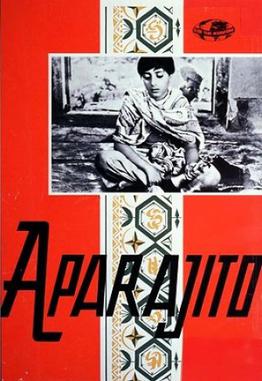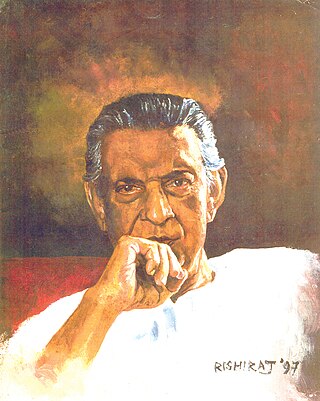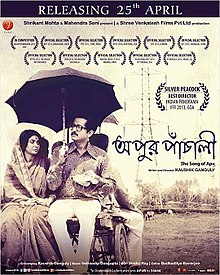
The Apu Trilogy comprises three Indian Bengali-language drama films directed by Satyajit Ray: Pather Panchali (1955), Aparajito (1956) and The World of Apu (1959). The original music for the films was composed by Ravi Shankar.

Pather Panchali is a 1955 Indian Bengali-language drama film written and directed by Satyajit Ray in his directoral debut and produced by the Government of West Bengal. It is an adaptation of Bibhutibhushan Bandyopadhyay's 1929 Bengali novel of the same name and features Subir Banerjee, Kanu Banerjee, Karuna Banerjee, Uma Dasgupta, Pinaki Sengupta and Chunibala Devi in major roles. The first film in The Apu Trilogy, Pather Panchali depicts the childhood travails of the protagonist Apu and his elder sister Durga amidst the harsh village life of their poor family.

Aparajito is a 1956 Indian Bengali-language drama film written and directed by Satyajit Ray, and is the second part of The Apu Trilogy. It is adapted from the first half of Bibhutibhushan Bannerjee's novel Aparajito. It starts off where the previous film Pather Panchali (1955) ended, with Apu's family moving to Varanasi, and chronicles Apu's life from childhood to adolescence in college.

Apur Sansar, also known as The World of Apu, is a 1959 Indian Bengali-language drama film produced, written and directed by Satyajit Ray. It is based on the second half of Bibhutibhushan Bandopadhyay's novel Aparajito. Following Pather Panchali (1955) and Aparajito (1956), The World of Apu is the final part of Ray's The Apu Trilogy, about the childhood and early adulthood of a young Bengali named Apu in early twentieth century India. The World of Apu stars Soumitra Chatterjee and Sharmila Tagore ; the duo would go on to appear in many subsequent Ray films.

Satyajit Ray was an Indian filmmaker who worked prominently in Bengali cinema and who has often been regarded as one of the greatest and most influential directors in the History of cinema. Ray was born in Calcutta to a Bengali family and started his career as a junior visualiser. His meeting with French film director Jean Renoir, who had come to Calcutta in 1949 to shoot his film The River (1951), and his 1950 visit to London, where he saw Vittorio De Sica's Ladri di biciclette (1948), inspired Ray to become a film-maker. Ray made his directorial debut in 1955 with Pather Panchali and directed 36 films, comprising 29 feature films, five documentaries, and two short films.

Satyajit Ray (1921–1992), a Bengali film director from India, is well known for his contributions to Bengali literature. He created two of the most famous characters in Feluda the sleuth and Professor Shanku the scientist. He wrote several short novels and stories in addition to those based on these two characters. His fiction was targeted mainly at younger readers, though it became popular among children and adults alike.
Subrata Mitra was an Indian cinematographer. Acclaimed for his work in The Apu Trilogy (1955–1959), Mitra often is considered one of the greatest Indian cinematographers.

Karuna Banerjee was a Bengali actress best known for her role in Satyajit Ray's The Apu Trilogy (1955–1959) as the long suffering mother, Sarbajaya. She was nominated for Best Actress at the 1959 BAFTA Awards for her performance in Aparajito (1956), the second part of The Apu Trilogy. She appeared in a number of other films after that, including Ray's Devi (1960) and Kanchenjungha (1962).

Subir Banerjee is an Indian actor who played Apu in Satyajit Ray's Bengali film Pather Panchali, the first installment of The Apu Trilogy.

Kailashey Kelenkari is an Indian Bengali thriller film directed by Sandip Ray based on the novel of the same name by Satyajit Ray. The film was released on 21 December 2007. Satyajit Ray visited the famous Ellora Caves near Aurangabad around 1940−41. Ray was so fascinated with the beauty of the Kailash Temple and the caves that he was inspired by it when he penned his crime thriller Kailashe Kelenkari. It is the second film of the New Feluda franchise as well as the sequel of Bombaiyer Bombete.

Satyajit Ray was an Indian director, screenwriter, documentary filmmaker, author, essayist, lyricist, magazine editor, illustrator, calligrapher, and composer. Ray is widely considered one of the greatest and most influential film directors in the history of cinema. He is celebrated for works including The Apu Trilogy (1955–1959), The Music Room (1958), The Big City (1963), Charulata (1964), and the Goopy–Bagha trilogy (1969–1992).[a]

Cinema of West Bengal, also known as Tollywood or Bengali cinema, is the segment of Indian cinema, dedicated to the production of motion pictures in the Bengali language widely spoken in the state of West Bengal. It is based in the Tollygunge region of Kolkata, West Bengal, India. The origins of the nickname Tollywood, a portmanteau of the words Tollygunge and Hollywood, dates back to 1932. It was a historically important film industry, at one time the centre of Indian film production. The Bengali film industry is known for producing many of Indian cinema's most critically acclaimed global Parallel Cinema and art films, with several of its filmmakers gaining prominence at the Indian National Film Awards as well as international acclaim.
Kaushik Ganguly is an Indian film director, screenwriter and actor in Bengali cinema. Multiple National Film Awards winner Actor-Director, Kaushik Ganguly is known for making films that explore various aspects sexuality, like Ushnatar Janye (2003), which deals with a lesbian relationship, and Arekti Premer Golpo (2010), which examines transgender identity & Nagarkirtan (2017), an LGBTQ Movie. In 2019, Film Companion ranked Ridhi Sen's performance in Nagarkirtan which was directed by Ganguly, among 100 Greatest Performances of the decade.

Laptop is a 2012 Indian Bengali language drama Film written and directed by Kaushik Ganguly. It tells different stories of people connected by a single laptop, according to the director, the laptop is the antagonist of the film and not just a common thread between the main characters. It went to the 2011 IFFI and the 2011 Dubai Film Festival.

Parno Mitra is an Indian actress who appears in Bengali films. Mitra started her career on television. Her acting assignment was Ravi Ojha's Bengali TV series Khela (2007). She was catapulted to stardom after she enacted Ranjana in Anjan Dutta's National Award winning Bengali film Ranjana Ami Ar Ashbona (2011).

Suman Ghosh is a film director, and a professor of economics at Florida Atlantic University.

Byomkesh was a 2014 Indian Bengali crime fiction television series based on the Bengali sleuth Byomkesh Bakshi created by Sharadindu Bandyopadhyay. The series starred Gaurav Chakrabarty, Saugata Bandyopadhyay and Ridhima Ghosh as Byomkesh Bakshi, Ajit and Satyabati respectively. The series premiered on 20 November 2014 on Colors Bangla channel and ended on 14 November 2015. This series is re-runned on 4 March 2024. The first episode was narrated by Sabyasachi Chakrabarty.

Chotoder Chobi is a 2014 Indian Bengali language feature film directed by Kaushik Ganguly. The film stars Dulal Sarkar and Deblina Roy in the lead roles. The film is directed by Ganguly and follows his earlier work on Laptop, Shabdo, Apur Panchali and Khaad. The plot revolves around the lives and opinions of a group of dwarfs who work as jokers in a circus. The film was released on 23 January 2015. Produced by Shrikant Mohta of Shree Venkatesh Films, the film's music was scored by Indradeep Dasgupta. The main cast as well as supporting actors were previously non-actors but Sarkar, one of the lead actors in the film, was awarded the Best Actor award at the 45th International Film Festival of India. It won the National Film Award for Best Film on Other Social Issues.

The 44th International Film Festival of India was held on 20 to 30 November 2013 in Goa.

Kora Pakhi was an Indian Bengali television soap opera that premiered on 13 January 2020, and airs on Bengali General Entertainment Channel Star Jalsha, and is also available on the digital platform Hotstar. The show was produced by Magic Moments Motion Pictures of Saibal Banerjee and Leena Gangopadhyay, and starred Parno Mittra and Rishi Kaushik.

















